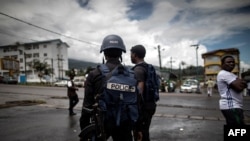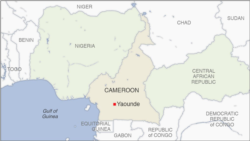Cameroon's journalism association has called on authorities to immediately and unconditionally release journalists detained while covering anti-government protests this week.
Police detained at least eight journalists covering Tuesday's protests, searched the homes of four of them, and seized or destroyed their equipment. At least one journalist was still in custody Thursday.
Tah Javis Mai, a freelance journalist, returned Thursday to his office in the English-speaking southwestern Cameroon town of Buea. Mai said he was arrested by police in the French-speaking coastal city of Douala on Tuesday while reporting on protests against President Paul Biya.
"The men in uniform asked that why am I using my phone to film them," Mai said in a telephone call from Buea. "I said I am on a Skype call. They took us to that brigade in Bonaberi. One drinking alcohol poured the whiskey on me. He asked me to drink, and I refused. He poured it on my head. We were in an airtight cell. A cell for about two people, we were 15 in number with no food. Our phones were confiscated. They took everything from us."
Mai said he was forced to sit on the ground for seven hours. He said he was released at 6 p.m. Wednesday after pressure from journalism associations and several international rights groups.
Jude Viban, president of the Cameroon Association of English-Speaking Journalists, said Mai was arrested with seven other reporters in Yaounde and Douala.
Those arrested included My Media Prime TV cameraman Tebong Christian, cameraman Rodrigue Ngassi of Equinox TV, Lindovi Ndjio of La Nouvelle Expression, and Polycarpe Essomba, Cameroon correspondent of RFI.
"We have strongly condemned the arrest of our colleagues who went out to report and not to support the protest, and they were picked up arbitrarily and detained in facilities without communication, without access to their lawyers, without access to their colleagues," Viban said. "This is terrible for our democracy and, unfortunately, it keeps happening. It is a very difficult period to be a journalist in Cameroon."
On Thursday, the National Syndicate of Cameroon Journalists reported that the homes of four journalists were searched by police. The report said phones, recorders and computers were seized.
Rights activist Andelbert Mvomo said Cameroon is becoming notorious for its abuses on journalists, including beatings and rights violations.
Such acts, he said, soil Cameroon's image and disgrace its people.
Cameroonian police and the minister of territorial administration did not react to the accusations when contacted by VOA.
The Committee to Protect Journalists said Thursday that police were still holding one of the arrested journalists, Lindovi Ndjio.
Samuel Wazizi
CPJ said it has not forgotten what happened to journalist Samuel Wazizi, who died in police custody in August 2019 but whose body has yet to be seen.
The military said it was keeping Wazizi's body for investigations.





